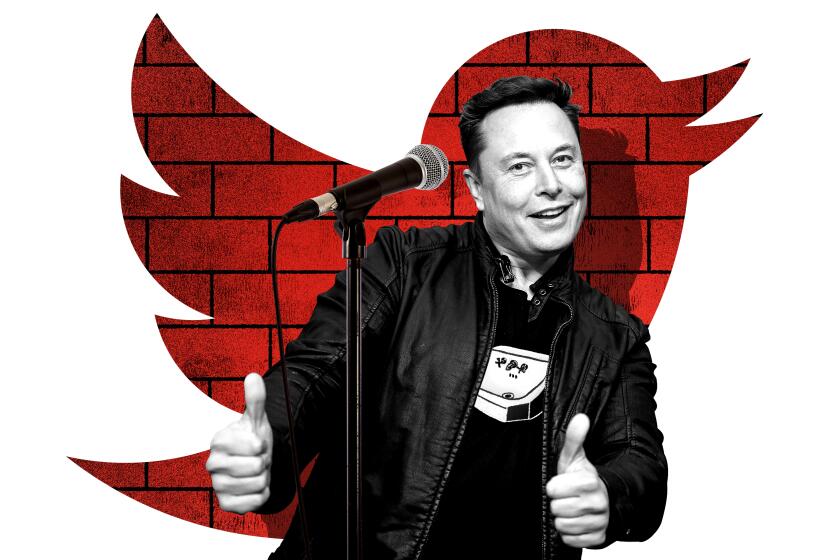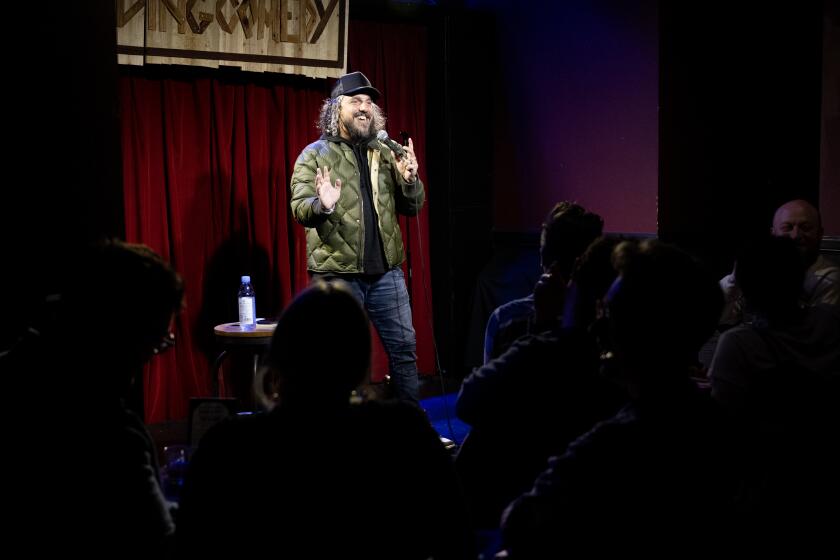Lewis Black is still angry, but he’s happy to see you

- Share via
It’s important to be honest, and the stand-up comedian Lewis Black really “didn’t do well” during the early stages of the COVID-19 pandemic, by his own account.
You remember: those early days of isolation starting in 2020 when people stayed away from each other, life migrated indoors and America got really, really weird. A lot of people are ready to forget and move on.
But Black, a longtime contributor on Comedy Central’s “The Daily Show” — so well known for his grouchy persona that he voiced the flame-headed character Anger in Disney Pixar’s “Inside Out” — isn’t ready to move on.
Black’s new hourlong stand-up comedy special, “Tragically, I Need You,” now streaming on YouTube and available via CD and streaming audio, has seized on our return to (relative) normalcy as the right time to reflect on how poorly we all did when the virus hit.
The New York-based comedian recently spoke with The Times during his Off the Rails tour about what the pandemic taught him about people and about his own creative process, which he hones on the road with an aggressive touring schedule, interspersed with new episodes of his “Rantcast” podcast.
Black is also returning as Anger in “Inside Out 2” and had been slated to guest host “The Daily Show” next week before the Writers Guild of America strike interrupted production.
This interview has been edited for brevity and clarity.
What did you do during the pandemic?
I basically spent most of the time trying not to die. I was told from the very beginning that I had an underlying condition. The whole thing was a recipe for disaster. How much do you really [need to] scrub your vegetables and fruits and stuff that’s coming into the apartment with Clorox? I thought my reaction was, quite simply, funny. My reaction was, “Here’s what an idiot does in response to a major pandemic.” I ended up going out on stage and starting to talk about it and people were laughing. I write in front of the audience.
You used to be a playwright for a long time, and writing can be incredibly lonely, but your creative process as a comedian is very social.
It was 500 days between performances [after the pandemic began]. It was the fastest that I ever went from starting to work on a new special to when the new special was done; it was probably eight months. The people who were showing up to see me, the audience coming out, related to it. Nobody knew what to do [about the pandemic], and they were acting like they knew what to do.
I noticed you didn’t use Trump’s name in the special.
His name is used too much. I’ve never heard ex-presidents’ names used that much. Ever. The joke that I said is that I didn’t say his name because his ears perked up. They say his name — and I’m from New York — and nine out of 10 New Yorkers have a problem with him and think he’s a criminal.
In your public writing process, I’m wondering if you found your audiences reacted much differently, or more, or less, to material about Trump versus material about, say, the pandemic.
All I had to do is talk about it a little, and somebody in the audience would get upset on levels that I had not seen since, literally, I [was] learning to become a stand-up. I’ve gone after both sides my entire life, and now you’re upset?

It sounded like you were reading a lot during the pandemic. Did you actually have any successful reading experiences, or was it all kind of like fever?
My brain couldn’t remain focused. I would start reading and then my brain would go “We’re all going to die!” about every two or three paragraphs. I mean, it really was spun out. I’m still just getting back to reading, finally.
COVID drinking too, was that a thing?
I was pretty good with that. I [gave myself] like two glasses of wine. Which my shrink said — when I said, “That’s got me a touch worried” — he said, “Better than lithium.” The glasses of wine are probably better than any of the antidepressants you can take. And it worked! What I did do is I binge-watched, I binge-watched a ton of TV. And part of the reason I binge-watched, besides the distraction level, is the fact that I’ve waited my whole life for TV to be that type of mature and be that smart and have that level of acting, that level of writing.
You mentioned that you went 500 days without touring. You’re back on the road. How often are you normally in front of an audience?
Anywhere between 100 and 150 times a year.
So you’re not exaggerating when you said that the audience is your primary relationship.
Part of the reason I didn’t find myself in a relationship was by the time I made it as a comic, I was touring my brains out. I was selfish about the fact that I wanted to do these things. When I was writing plays, I wasn’t gonna then try to figure out how to make a living, raise children.
How old are you now?
74.
By the way, I just read that your mom died. I’m really sorry to hear that.
Yeah, that was tough. But you gotta remember, she was 104.
Your dad was really old too, right?
My dad was 101.
Oh, my God. What are they doing over there in your family?
It’s pretty crazy I have an underlying condition, considering both my parents died of natural causes in their sleep without pain.
Have you noticed any difference in the audiences from before and after the pandemic?
Initially, there was a lot more excitement. For anyone who has a following, no matter what size, most people were really excited to see you again. These people have been indoors way too long. That was kind of amazing, how much they craved performance as much as we needed to perform.
You’ve also started podcasting too.
I call it “Rantcast,” but we hadn’t been able to do it during this run of the tour because it was really, literally like doing two shows.
Well you know, with AI now, you can just get your voice turned into a computer voice and have the computer do the screaming for you.
When they said you can now have your mother and father with you forever, I was like, wow — that’s, phew, I don’t know.
Yeah, would you actually want that?
No. There’s got to be something that really gave you comfort for you to want to hear that voice again — in the sense of, oh, “I really would need to hear that.” My mother would be, “What’s the matter with you? Why are you wearing that shirt? Why did you get a haircut before the show? You never get a haircut before the show. You do it three days before the show!”
More to Read
The biggest entertainment stories
Get our big stories about Hollywood, film, television, music, arts, culture and more right in your inbox as soon as they publish.
You may occasionally receive promotional content from the Los Angeles Times.













